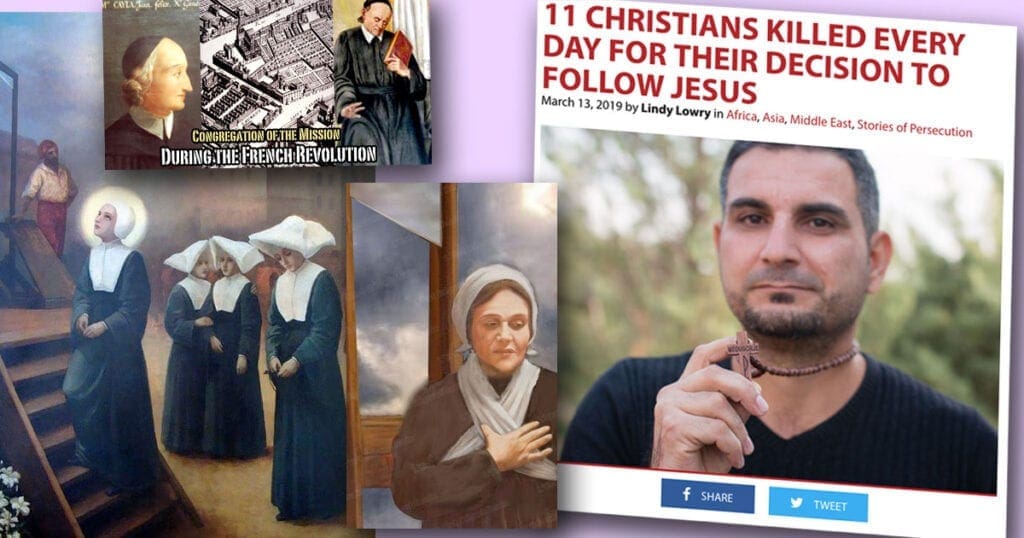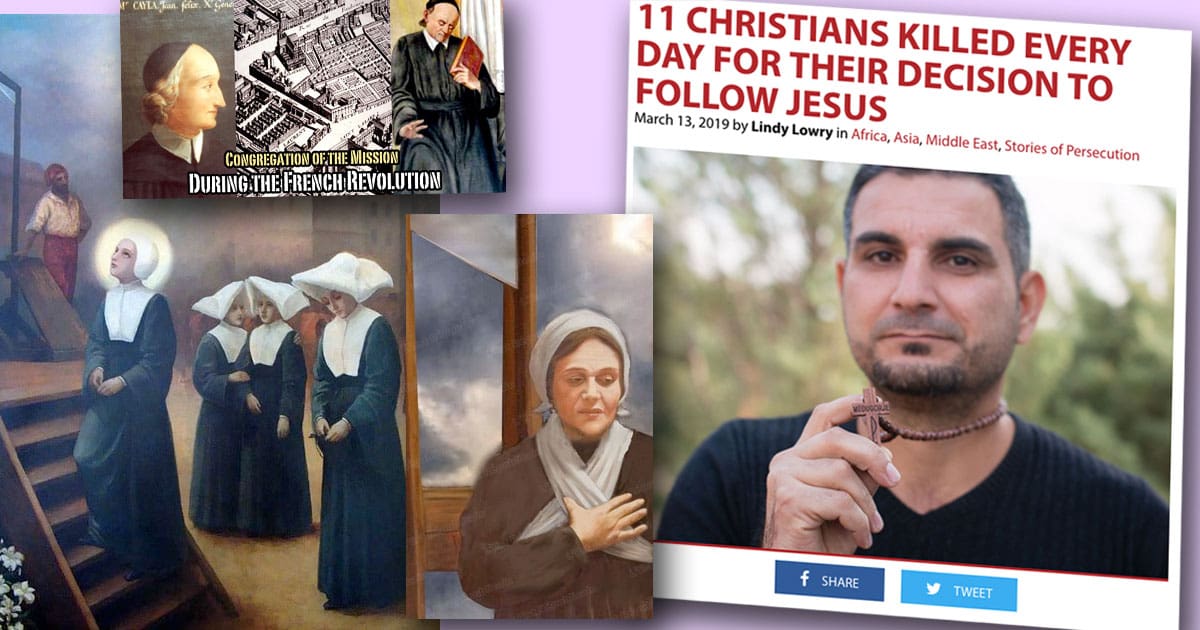Vincentian Faith in Times of Government Suppression
It should not be a secret, but, unfortunately, not too many people today are aware of that a staggering 11 Christians are killed each day for their faith in the top 50 countries ranked on the World Watch List.
The following is a slightly edited version of Fr. Joe Hubbert’s timely reflections on the “Vincentian Family Martyrs of the French Revolution” shared with those attending the Summer Novena of Hope, July 9, 2019 at Mary’s Central Shrine in Germantown, PA.
With the recent celebrations of the 4th of July, among many qualities hailed as part of the foundation of the United States, two stood out for me… courage and commitment.
For on this 6th Monday of the summer novena dedicated to “Vincentian Saints and Blesseds, Models of Holiness,” it is for us today to consider the women and men in the Vincentian family who died in upholding our faith during the time of the French revolution, that is, between 1789 and 1796. As martyrs, they have been recognized by the church to be among those we call “blessed.”

Who were these martyrs?
Five of the blessed martyrs were members of the Congregation of the Mission. Four died early on in the unfolding of the revolution as what began with the somewhat peaceful overthrow of the royal French government, took a bloody turn. Four Vincentian priests died in the midst of mob violence in Paris on September 3, 1792; the fifth Vincentian priest died at the hands of “lady guillotine” in 1796 when he was arrested following his effort to bring the Eucharist to others in the face of their pain and suffering.
Seven of the blessed martyrs honored by the church and the Vincentian Family were daughters of charity… two died along with 97 other people executed by firing squad near the town of Angers in February of 1794 . . . Five others were put to death by means of the guillotine in other French towns in 1794 [one in Dax in April and four in of the town of Arras two months later].
Why were they put to death?
As one of our Vincentian historians’ notes conditions in late 18th-century France are “complex and difficult to understand.” Pope St. John Paul II speaking on February 19, 1984 at the beatification of the 99 martyrs of Angers, pointed to the reality of the waves of political, economic and military tensions released by the revolution. Those tensions soon led to a situation in which the honored martyrs, and many others, refused to take an oath of loyalty to a constitution which placed control of the Catholic church in France under the power of the new government.
The Vincentian martyrs, and many others upholding their Catholic faith, were soon accused of being traitors to their country – a great irony in that they were offering the very care for all people, and for those most in need that was a central value of the revolution, Recall the motto: liberty, equality, fraternity.
In 1984 Pope John Paul went on to praise those being beatified for their “determination to remain faithful, at the risk of their lives.” Taking words right from the death warrants issued in order to accomplish the executions of the blessed, he explained that there should be no doubt, that these blessed died because of the hatred for their faith held by their judges who despised such faith “as ‘unfounded devotion’ and ‘fanaticism.'”
To what did they give witness through their deaths?
1) Courage
They gave witness to courage and dignity in living their baptismal and religious vocation in the face of false accusations, in the face of lengthy imprisonment, or even being denied the right to defend themselves, and being convicted on charges for which no true case was ever made.
In the case of the Congregation of the Mission martyrs of Paris September 1792: one of these priests, Fr. Louis-Joseph Francois was a powerful voice against surrendering to the power of the anti-religious forces of the revolution. He was also a famed preacher and writer of pamphlets. He provided sound reasoning and encouragement for such a stand. Nevertheless, they offered support to one another in the midst of riotous violence in which a murderous mob of men and women vented its unfounded anger with clubs. Two of the men, John Charles Caron, and Nicolas Colin happened to be visiting the house that was attacked by the mob.
Bl. Marguerite Rutan (58 yrs old, 38 years a Daughter of Charity) dealt with the shortage of necessary resources to support the work of the hospital in Dax, of which she was the administrator. In the face of mounting false accusations of financial corruption*, she and other Daughter’s continued to serve the sick poor in the hospital and thorough home visits. Actually, the corruption claim seems to have grown out of her offering hospitality to soldiers of the revolution itself.
Sisters Marie-Anne Vaillot (58) and Odile Baumgarten (43) showed their courage and dignity in refusing to betray the church and even refusing to allow a sympathetic guard, filled with good intentions, to make a false claim that they had taken the unaccepted oath demanded by the government.
2) Commitment with great trust in the providence of God
Bl. Rene Roque, 38 years old, had palayed a significant role in building up the courage of other clerics in and around his home town of Vannes. Noted for his own trust in God, he urged his superior to flee the rising danger. He, however, stayed in Vannes, continuing to celebrate mass secretly in the face of possible betrayal. His betrayal took place when as a result of his bringing the Eucharist to a sick person, he was handed over to authorities. It is for this reason that he is depicted holding a ciborium. While in prison he refused the chance to escape that was given to him – and 24 hours after a hasty trial he was executed on March 3, 1796.
Bl. Marie Madeleine Fontaine and three other Daughters faced certain death mainly because of a blood-thirsty revolutionary who for lack of any true charges, even categorized them as “women under suspicion of being under suspicion.” Nevertheless, they bolstered the courage of fellow prisoners with their trust in God, especially reflected as they were sure that in giving their lives, no one else would die. On their day of execution, June 26. 1794, addressing the crowd of onlookers– a crowd notably silent in awe of the dignity and courage of these Daughters of Charity– Sr. Madeleine said: “Christians listen to me! We are the final victims. Tomorrow the persecution will be over, the scaffold will be dismantled, and the affairs of Jesus will rise glorious again” Indeed no other prisoners awaiting death in that place were executed, and within a month, the leader of the reign of terror fell from power, and died in Paris under the guillotine.
3) Marian devotion
In the stories of the Daughters of Charity martyred during the French revolution, their devotion to our blessed mother and to her intercession is quite clear. Their devotion helped them remain courageously faithful, and was the means by which they offered solace to their fellow prisoners through praying the litany of Our Lady… symbols of Mary reflected in the litany visible here in the shrine.
It is noted that when she ascended to the guillotine, Sister Marguerite Rutan chanted the Magnificat, the Blessed Mother Mary’s proclamation of faith, words that, as a contemporary Daughter of Charity has reflected, flowed from Sister Marguerite’s life of service to the poor that itself proclaimed continuously the greatness of the lord.
Though we must acknowledge that their martyrdom took place some 35 years before the apparition of Mary to St. Catherine Labouré, there is no doubt that the courage and faith of the women and men noted today was built on a legacy of truth and confidence in Mary’s intercession
The legacy in which these men and women of the Vincentian Family were formed and to which they turned in time of need, the legacy from which the devotion to the Miraculous Medal arose in 1830 is that legacy which brings us here to Mary’s Central Shrine, the legacy that touched the heart, and guided the work of Fr. Joseph Skelly, CM whom we honor today on the 56th anniversary of his death in 1963
Conclusion
In 1983, a year before the beatification of the martyrs of Angers, including the Daughters of Charity, Marie-Anne Vaillot and Odile Baumgarten, the then Bishop of Angers offered an essential point for us as we remember and honor the witness given by all of the members of the Vincentian Family who died to uphold our faith. As recounted by our own Father John Carven, the bishop explained that the act of beatification does not seek “to make us dream about the past,” but rather to offer “the past to us, to read over again, so that we may relate it to the time God gives us, that present time in which Christ asks us, in our turn, to be his witnesses.”
We do well then to call upon our Blessed Mother to provide courage and consolation to our fellow believers dealing with challenges similar to those faced by the Vincentian Martyrs of the French Revolution.
May Mary help us so that our voices can continue to oppose with courage and commitment, injustice in our world that threatens the dignity of each human being – most especially the injustice that threatens religious freedom. As we pray in Germantown we are joined with a “multitude of witnesses” who have gone before us.
Tags: Vincentian Martyrs









Thank you!